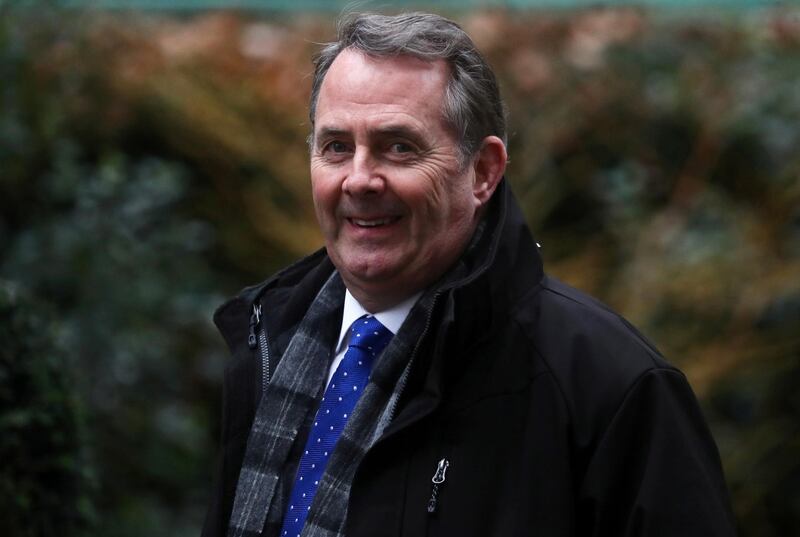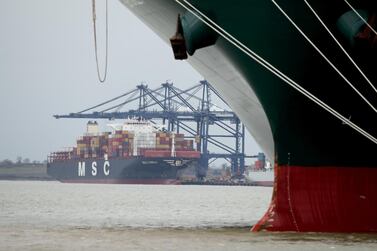Britain should adopt a carbon border tax to help the global fight against climate change, former international trade secretary Liam Fox said on Thursday.
The tax, a levy on emissions attributed to imported goods that have not been carbon-taxed at source, should form part of the world’s response to tackling global warming and Britain should embrace the policy, Mr Fox told delegates at a webinar hosted by UK think tank, the Centre for Policy Studies.
Mr Fox, who served as international trade secretary from 2016 to 2019, said the UK’s chairmanship of this year’s G7 offered the country a great opportunity to introduce the carbon border levy.
“As we head towards Cop26 in Glasgow, we must use the opportunity not just to chair but to lead. Using market mechanisms offer the best hope," he said.
“The aim is to put an additional price on imports from countries where it's cheaper to pollute, and level the playing field for domestic industries that produce goods with lower levels of greenhouse emissions. In many ways, it is a win.”
The race to address climate change is ramping up across the globe with the International Monetary Fund's chief executive Kristalina Georgieva recently urging countries to take immediate action to avert disaster.
Ms Georgieva said last month that accelerating the push for greener economies would boost the recovery from the Covid-19 pandemic, with a policy mix of carbon taxes and green investment potentially increasing global output by about 0.7 per cent over the next 15 years and creating about 12 million new jobs by the end of 2027.
The idea of a carbon border tax is gaining interest from world leaders as a way of shielding domestic workers who are manufacturing energy-intensive goods, while encouraging other nations to slash emissions. Having to pay a tariff would meanwhile discourage companies from moving operations to countries with less stringent rules.
Ultimately, Mr Fox said western countries did not want to see their own businesses moving manufacturing bases to places such as China or India, because of their less stringent environmental rules and consequent lower costs.
“Countries such as the UK or those in the EU argue that producers in their own countries, who have already applied measures to reduce emissions through carbon pricing, are handing foreign suppliers, who do not bear these costs, a competitive advantage," he said.
"Over time, they argue it will shift production to low cost high emission countries, which will have the net effect of punishing our own industries and jobs, damaging our international competitive nature, yet doing little to limit global emissions themselves."
🚨 3… 2… 1… 🚨
— Centre for Policy Studies (@CPSThinkTank) May 27, 2021
We’re now live!
Speaking from the CPS, Dr @LiamFox will set out how the UK can lead the fight against climate change, and make the case for a carbon border tax.
Click here to watch ⬇️
The EU favours a carbon border adjustment mechanism as part of its Green Deal agenda, with the US also interested in evaluating whether a similar mechanism is worth implementing.
However, while the UK is largely supportive, it is adopting a cautious approach as it fears the EU might use carbon border taxes as post-Brexit protection, according to a recent study by the Centre for Economics and Business Research.
To make his case for a carbon border tax, Mr Fox said 17 countries around the world each produce more than 1 per cent of the world's carbon dioxide.
Of the top six polluters, China produces 27.9 per cent of the world’s carbon dioxide, followed by the United States at 14.5 per cent and India at 7.2 per cent, with Russia, Japan and Iran contributing smaller amounts.
Meanwhile, 11 countries produce between 1 and 2 per cent of the world’s carbon dioxide, ranging from Germany at 1.93 per cent to the UK in 17th place with 1.01 per cent.
Mr Fox highlighted the countries working hard to cut pollution, with the US reducing emissions by 3.7 per cent between 2009 to 2019, Germany by 11.1 per cent, France by 15.2 per cent while the UK comes top with a reduction of 25.1 per cent.
By contrast, Mr Fox pointed to countries "going in the other direction", with Canada increasing emissions by 6.3 per cent, Turkey by 28.6 per cent, China by 31 per cent, Brazil by 33 per cent, Indonesia by 38 per cent and India 62 per cent.
“If we're to deal effectively with the challenge, we need to establish policies and mechanisms that will encourage a shift away from carbon dioxide production in those countries who are contributing most to the problem,” Mr Fox said.
While carbon border taxes have the potential to transform world trade, according to Cebr research, the cost of the levies would lead to higher prices, with the price of steel rising by more than 10 per cent, petrochemicals by 5 per cent and electronic goods, machinery and vehicles by up to 5 per cent, the think tank warned.
Mr Fox acknowledged that in recent months there has been growing pressure on the EU to hasten the introduction of a carbon border tax, as record prices for carbon dioxide allowances raised the cost of polluting in the block far above any other global region.
Carbon prices in the EU’s flagship emissions trading scheme, a key part of the plan to cut emissions by 55 per cent by 2030, are more than €50 ($61) a tonne, more than double the pre-pandemic level, Mr Fox said.
“Many across industry argue that pricing of this level is counterproductive, as it can stop companies having the funds they need to invest in decarbonisation itself,” he said.
Using the steel sector as an example, Mr Fox said a carbon border tax would have different effects on steel imports, depending on the country of origin.
“For example, Chinese steel manufacturers primarily use blast furnaces and basic oxygen furnaces, emitting about two metric tonnes of carbon dioxide equivalent per metric tonne of steel produced," he said.
"Turkish companies, by contrast, mainly use electric arc furnaces, emitting only one metric tonne of carbon dioxide equivalent per metric tonne of steel produced. So carbon border tax would differentially affect Chinese and Turkish steel exports and be much more favourable to the lower carbon emission producers.”
While the principles of the carbon border tax are relatively straightforward, Mr Fox said, there are complex, practical issues to be resolved, such as which countries and industries should be covered, how emissions are measured and how to ensure there is sufficient verification to avoid cheating.
With the UK making a huge reduction in emissions in recent years, Mr Fox said there was little sense in introducing domestic measures that would only overstress the economy.
“There's no point in damaging the competitiveness of economies such as the UK, while other countries maintain their competitive edge at a cost to the global climate,” he said.








